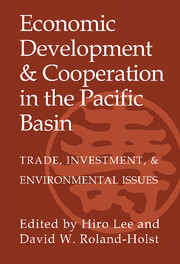 Economic Development and Cooperation in the Pacific Basin
Economic Development and Cooperation in the Pacific Basin Book contents
- Frontmatter
- Contents
- Acknowledgments
- List of Contributors
- I Introduction and Overview
- 1 Prelude to the Pacific Century: Overview of the Region, Leading Issues, and Methodology
- II U.S.-Japan and Asian Trade Patterns
- III Regional Trading Arrangements in the Pacific Basin
- IV Foreign Direct Investment: Determinants and Consequences
- V Trade, Resources, and the Environment
- Index
1 - Prelude to the Pacific Century: Overview of the Region, Leading Issues, and Methodology
Published online by Cambridge University Press: 19 May 2010
- Frontmatter
- Contents
- Acknowledgments
- List of Contributors
- I Introduction and Overview
- 1 Prelude to the Pacific Century: Overview of the Region, Leading Issues, and Methodology
- II U.S.-Japan and Asian Trade Patterns
- III Regional Trading Arrangements in the Pacific Basin
- IV Foreign Direct Investment: Determinants and Consequences
- V Trade, Resources, and the Environment
- Index
Summary
INTRODUCTION
The Pacific Basin is the most robust economic region of the world. More than half the world's population resides in countries bordering on it, and this region's average economic growth rate has been double that of the rest of the world since 1970. The volume of trade on the Pacific is three times that on the Atlantic and has been growing twice as fast. In less than a generation, this region has become the global pacesetter for market-based economic development and a model of efficient international specialization. This volume examines a number of leading issues facing the Pacific Basin and collects the research and opinions of experts from around the region on its economic prospects into the next generation. In particular, some authors examine the received history of trade rivalry and the new initiatives for regional cooperation in trade. Other authors examine Pacific multilateralism from the capital account perspective, detailing a complex web of foreign direct investment linkages that now pervade the region. Finally, two chapters examine an important emergent issue in the region and the world - links between trade, sustainable resource use, and the environment. Taken together, these studies cover issues of the highest priority for policy dialogue and research, in this region and in the context of multilateralism generally, now and for the foreseeable future.
As we enter the Pacific Century, an unprecedented set of promises and challenges lies ahead. Can a new global paradigm of market-based, open multilateralism provide the economic momentum to lift over one-quarter of humankind out of poverty at last? Can such a complex mosaic of trading economies also provide a basis for sustained cooperation, peace, and political stability?
- Type
- Chapter
- Information
- Economic Development and Cooperation in the Pacific BasinTrade, Investment, and Environmental Issues, pp. 3 - 34Publisher: Cambridge University PressPrint publication year: 1998
- 2
- Cited by
